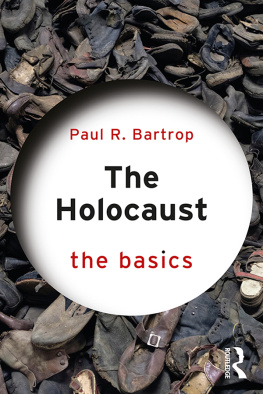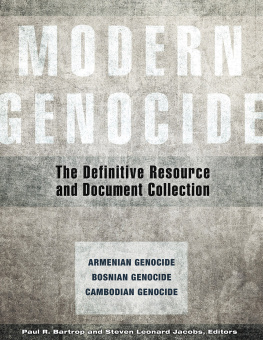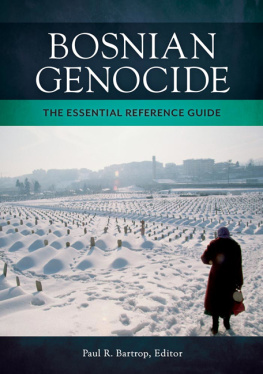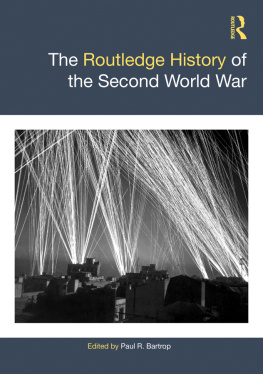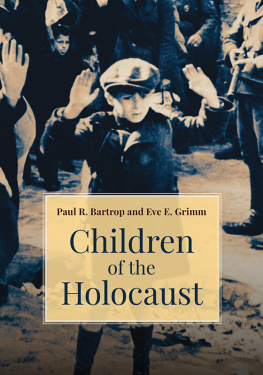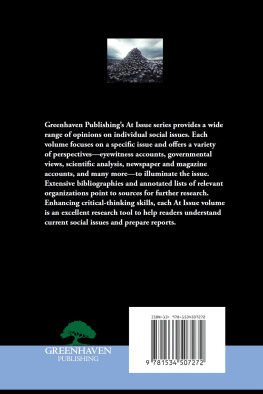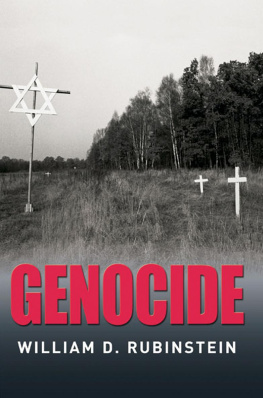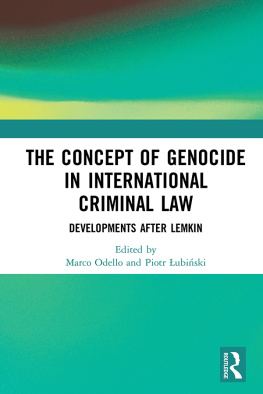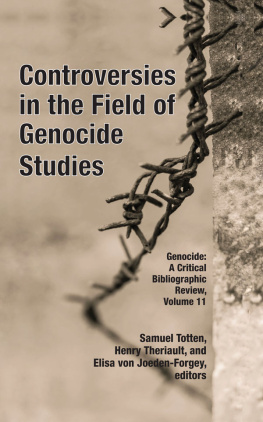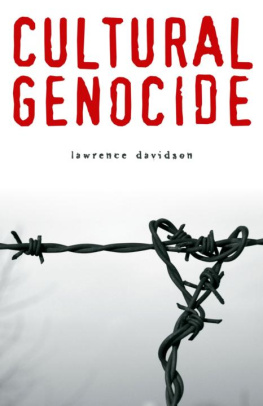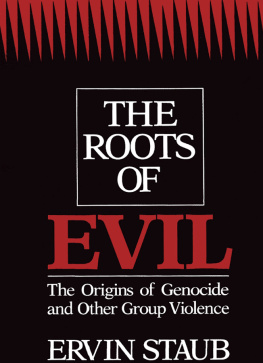PAUL R. BARTROP, PhD, is the 20112012 Ida E. King Distinguished Visiting Professor of Holocaust and Genocide Studies at Richard Stockton College, Galloway, New Jersey. He was formerly head of the History Department at Bialik College, Melbourne, and honorary fellow in the Faculty of Arts and Education at Deakin University. He has also taught at the University of South Australia, the Royal Melbourne Institute of Technology, and Monash University, from where he obtained his doctorate. His published works include Fifty Key Thinkers on the Holocaust and Genocide, The Genocide Studies Reader, Dictionary of Genocide, and Australia and the Holocaust, 19331945.
A BIOGRAPHICAL ENCYCLOPEDIA OF CONTEMPORARY GENOCIDE
Portraits of Evil and Good
Paul R. Bartrop

Copyright 2012 by ABC-CLIO, LLC
All rights reserved. No part of this publication may be reproduced, stored in a retrieval system, or transmitted, in any form or by any means, electronic, mechanical, photocopying, recording, or otherwise, except for the inclusion of brief quotations in a review, without prior permission in writing from the publisher.
Library of Congress Cataloging-in-Publication Data
Bartrop, Paul R. (Paul Robert), 1955
A biographical encyclopedia of contemporary genocide : portraits of evil and good / Paul R. Bartrop.
p. cm.
Includes index.
ISBN 978-0-313-38678-7 (hardcopy : alk. paper) ISBN 978-0-313-38679-4 (ebook) 1. GenocideBiography. 2. GenocideEncyclopedias. I. Title.
HV6322.7.B373 2012
364.1510922dc23 2012000953
ISBN: 978-0-313-38678-7
EISBN: 978-0-313-38679-4
16 15 14 13 12 1 2 3 4 5
This book is also available on the World Wide Web as an eBook.
Visit www.abc-clio.com for details.
ABC-CLIO, LLC
130 Cremona Drive, P.O. Box 1911
Santa Barbara, California 93116-1911
This book is printed on acid-free paper
Manufactured in the United States of America
CONTENTS
ENCYCLOPEDIA ENTRIES
Dedicated to the memory of journalists from all countries who have paid the supreme sacrifice to bring to the world news of the eviland the goodthat has been perpetrated since 1945, and to those who still put their lives on the line every day.
Preface
The Holocaust of the Jewish people by Nazi Germany and its allies between 1933 and 1945 was arguably historys worst expression of the crime called genocide. Other examples of mass death had occurred prior to then and have taken place since, but the phenomenon of genocide, defined by the United Nations in 1948 as one of a number of acts committed with intent to destroy a specific group, found an expression so far unprecedented in the Holocaust. Given this, it might be asked why this encyclopedia covers the years since then and does not include the Holocaust as well.
The answer is as obvious as it is respectful. The year 1945 was supposed to herald the start of a new era, a time in which killing on the scale of the Holocaust wouldand in view of that experience, couldnever again take place. For the survivors, it was unthinkable that the horror and devastation they had lived through should ever be repeated. That generation would have been utterly incredulous if they could have foreseen the state of the world just a few decades after the liberation of the camps and certainly would never have imagined that their experience would open the second half of what became known as the Century of Genocide. The promise of Never Again, it seemed, gave way to one of Over and Over Again.
In view of this, the idea of an encyclopedia examining those who have perpetrated, suffered, and tried to stop genocide since the Holocaust would seem to be both timely and necessary, if only for the reason that more and more people are demanding to know why it is that the hope embodied in the quest for Never Again was not fulfilled.
This encyclopedia highlights acts of good and evil in genocide since 1945. This crime is simultaneously the most horrific a group of people can perpetrate against another and, tragically, a major social, political, and economic problem for our times. Genocide, it might be said, speaks of human dreams: of how we can perfect humanity, or the society in which we live, or the community of which we are part. In attempting to reach such perfection, some people deem it necessary to eliminate those whom they consider to be an impediment to achieving this goal. In their view, they do so with the best of intentions and for the current good and guaranteed future of their group. Their victims, on the other hand, possess neither a present nor a future, other than as a group that until now has avoided their intended (and inevitable) fate.
While this might to some people sound reasonable, the period since 1945 has witnessed horrendous acts of violence, and this encyclopedia examines many of the key actors involved. Some were its victims. Others were its perpetrators, who planned, perpetrated, and/or presided over it. Some stood by and watched it unfold, while yet others took it upon themselves to try to stop it. The perpetrators were committed, for reasons clear to them, to the realization of the dream of achieving ethnic, racial, religious, or national homogeneity, a pure society comprising only others like themselves, a place representing the closest possible approximation to human perfection.
Even though perpetrators of genocide saw (and see) themselves as noble servants undertaking a necessary struggle, their victims obviously do not agree. Nor, for the most part, do the vast majority of bystanders, though all too often they either are frozen into immobility by the sheer horror of what they are witnessing or silently acquiesce to the perpetrators actions. Practically all agree that the deeds being carried out by genocide perpetrators are vicious, violent, inhumane, and, from the perspective of Western morality at least, morally wrong. Yet it takes exceptional courage and commitment to stand against them.
Theologians and philosophers seem to be more concerned about the problem of evil in the world than they are about good. From a religious perspective, some will ask, if God (or the gods) is all-loving and all-powerful, why do the wicked prosper and the righteous suffer? While an answer might be that we are ourselves too puny to recognize Gods Master Plan, but that all will nonetheless work out for the best in the long run, this is far from acceptable to many secular thinkers, who prefer to look for other reasons to explain the problem of evil.
Very few, however, consider the other pole to evil, good. What is a good action? Is it simply the opposite of evil? If evil behavior is a departure or aberration from the norm, can that norm be labeled as good? And if a person does some caring or compassionate action, is that beyond good? Further, does it matter why he or she does it? If a person does something out of the ordinary for the betterment of humanity, by what are his or her actions motivated? If the person feels better by his or her actions than he or she did beforehand, is that person in fact self-interested, rather than other-interested, in his or her motives? In some traditions, the motive matters less than the action, and thus if by virtue of that action a victim might be spared suffering or death, then it doesnt really matter why action was taken to help that person.
On the other hand, the very notion that a good action is something extra to what is normal makes one wonder whether that norm is, in fact, ethically neutral until tested. The questions mount up with each successive issue raised.


